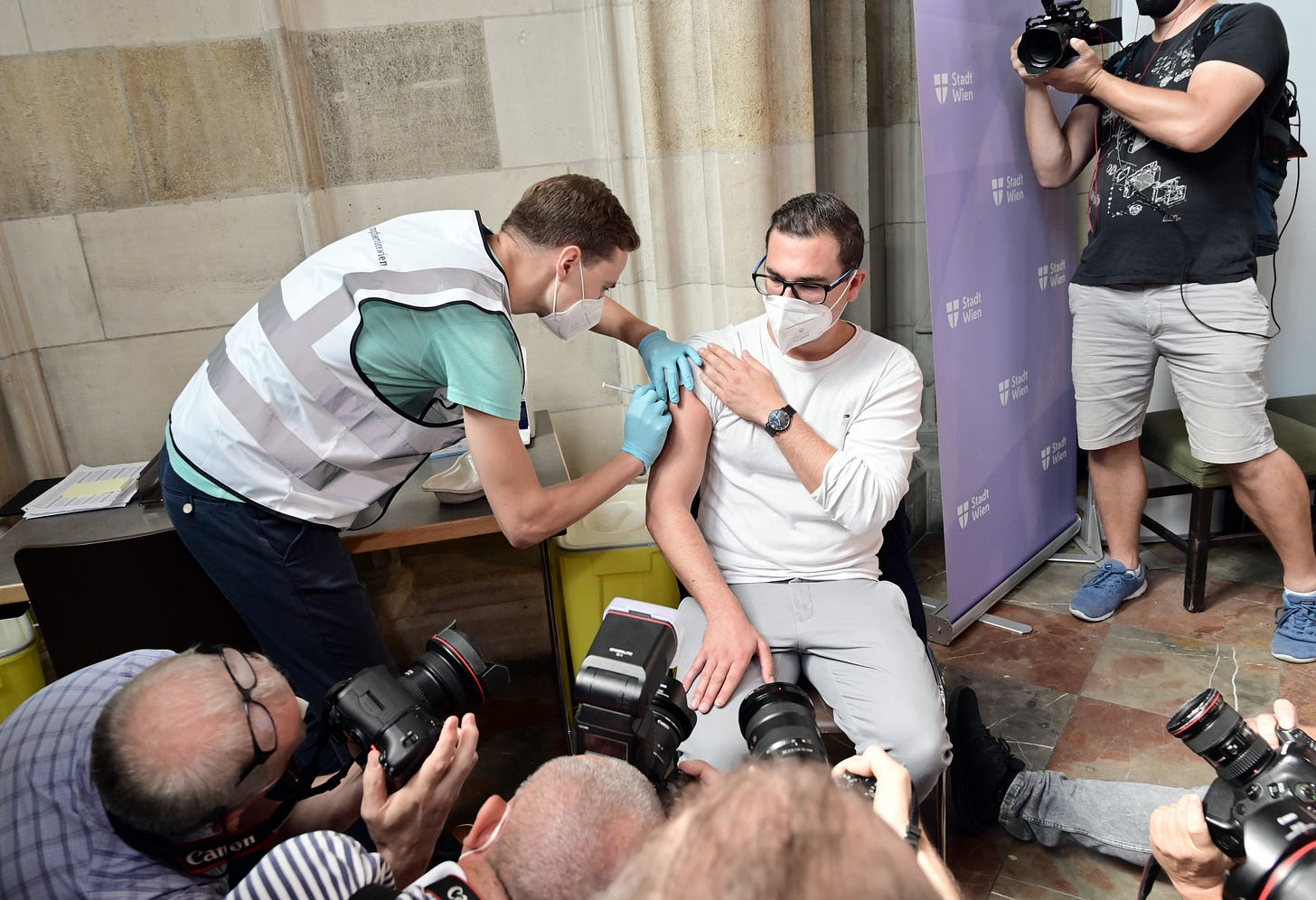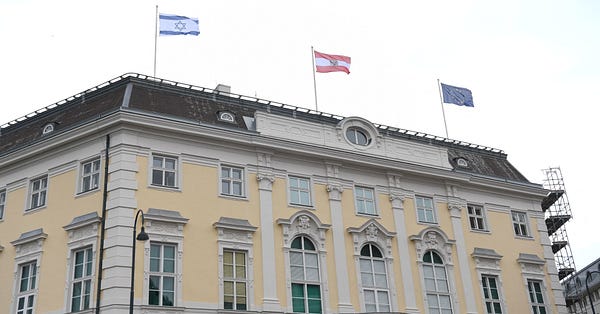60 Percent
It has never been easier to get a coronavirus vaccine in Austria, but 17 percent of Austrians say they may never get the jab. What now?

Servus!
More than 60 percent of the Austrian population has now received at least one dose of a coronavirus vaccine; more than 56 percent are fully vaccinated. Over 10 million doses have been administered since the vaccine campaign began at the beginning of January, but the pace of that drive has been slowing down since the end of June. On Monday, only around 2,000 first doses were put in arms nationwide. At once, since the beginning of July, COVID-19 case numbers have been on the up as the Delta variant spreads—particularly among the un-vaccinated population. On July 1, the seven-day incidence rate per 100,000 people stood at 7.1; on August 15, it hit 66.3.
Never has it been easier to get a coronavirus vaccine in Austria. Health authorities in Lower Austria have closed its larger, centralized vaccination centers, relocating resources to doctors’ surgeries and smaller pop-up locations. Vienna now has an extensive network of places where one can get vaccinated without an appointment, simply by presenting an ID card. There are vaccination containers, a vaccination boat in the Danube, two vaccination buses moving throughout the city, and vaccination stations at film festivals, swimming pools, shopping malls, and inside St. Stephen’s Cathedral.


In other words: Anyone who can get vaccinated now has the chance to do so. By summer’s end, nobody will be able to convincingly argue that they did not have an opportunity to get the jab. When I wrote to you a month ago about Austria hitting ‘max vax’, I was describing access, information, and time as impediments to getting vaccinated, particularly in poorly-connected rural areas and less-affluent urban ones. Those problems have now been alleviated; Austria is confronted with a new problem: What to do about those who, even when presented with a smorgasbord of options, simply won’t get vaccinated.
When asked by the pollsters Market-Institut, 13 percent of Austrians said they absolutely won’t get vaccinated. 4 percent said they didn’t want to do it, and another 4 percent refused to address the matter. That first 17 percent—the refuseniks and the doubters—translates to more than 1 million Austrians. Their purported motivations for holding out are diffuse. There is a clear relationship between refusing to get vaccinated and support for the far-right Freedom Party (FPÖ), Austria’s corona-skeptic party. There are those who subscribe to conspiracy theories, those who believe either their age or ‘being careful’ shields them from illness, and others who hold to pseudo-scientific myths about the vaccine and Western medicine in general.
With case numbers on the rise once more—and with another lockdown in the fall seemingly off the table—the national conversation has now turned to what to do about vaccine holdouts. Chancellor Sebastian Kurz and health minister Wolfgang Mückstein are insistent that the response will not be a general vaccine mandate. Kurz believes in individual responsibility and freedom of choice—when it comes to the vaccine, at least—and, more likely than not, such a mandate would be at once unenforceable and unconstitutional either at the domestic or European level.
Yet Austria could adopt a potpourri of measures that, together, constitute a mandate in all but name. As of September 1, new public sector employees in Lower Austria will have to be vaccinated; similar measures could be instituted at the state and federal levels nationwide. Vienna’s health secretary Peter Hacker has talked about changing entrance requirements for gastronomic and cultural venues, restricting access only to the vaccinated, a measure business interests oppose. The governors of People’s Party (ÖVP)-run states are known to want an end to free testing, a measure the Austrian Medical Association also favors but isn’t backed by Vienna mayor Michael Ludwig. The only way out of this crisis for Austria, as Hacker has said, is the vaccine, and the country’s ability to steer its way out of a fourth wave now depends on reaching those who right now seem unreachable.
Bis bald!


For Newlines, I’ve written a feature on Turkish president Recep Tayyip Erdoğan’s political interference in Austria and in the country’s Turkish-speaking communities via lobbying, espionage and political suasion. In the piece, I discuss not only the how, but why Erdoğan has been successful in cultivating support among Austrian Turks and the extent to which he and the Austrian right-wing have a mutually beneficial relationship.
Thank you for signing up to the Vienna Briefing. If you know someone who would be interested in receiving this newsletter, consider sharing it with them today.
Kabul Falls, Deportations Continue
Interior minister Karl Nehammer said deportations of Afghans whose claims for asylum have been rejected should continue even as Afghanistan capitulates to the Taliban. Nehammer said Monday that neighboring states should host ‘deportation centers’ to which Afghans can be sent.
Greens Go On
The Greens’ chief whip Sigi Maurer signaled her ongoing commitment to her party’s coalition with the ÖVP in spite of its hardline stance on Afghan asylum seekers. In an interview with the APA published Monday, Maurer cited the climate crisis as the main reason for remaining in government.
Dual Citizens Lose Passports
24 Turks living in Vienna have been stripped of their Austrian citizenship, having been found by local immigration authorities to be in possession of dual Austrian-Turkish citizenship. Dual citizenship is broadly illegal in Austria.



